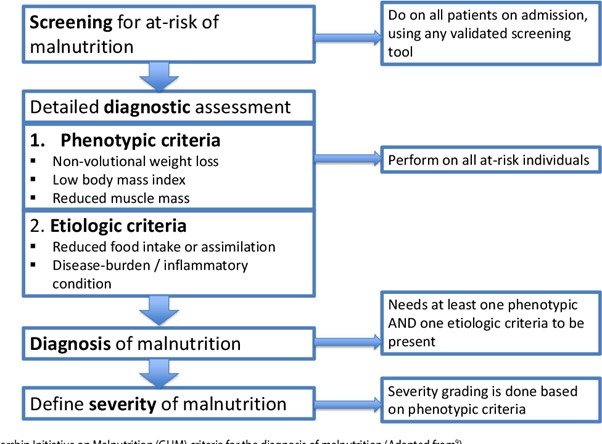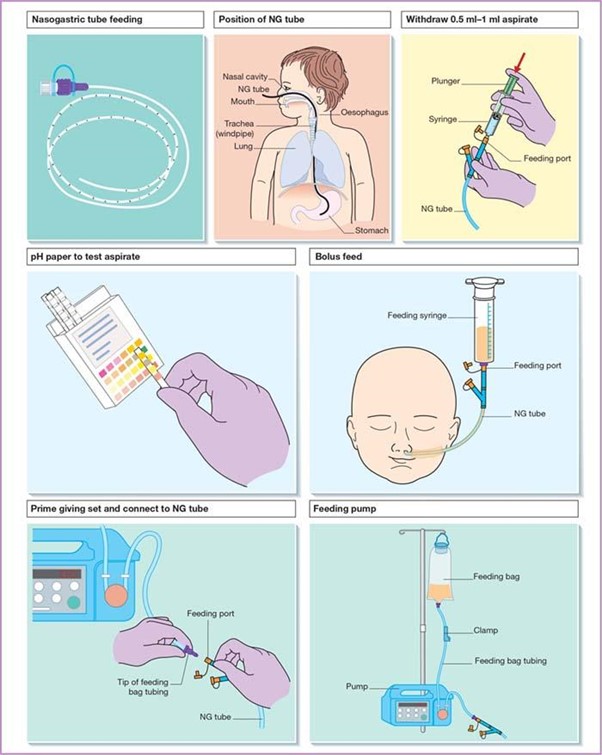The nurse is caring for a client who has been diagnosed with malnutrition. Which finding supports the medical diagnosis?
Body mass index (BMI) of 17.
Decrease in the appetite.
Dry mucosal membranes.
Weight of 227 pounds (103 kg).
The Correct Answer is A
Choice A
Body mass index (BMI) of 17 is the correct finding. A low Body Mass Index (BMI) is a common indicator of malnutrition. BMI is a measurement that considers a person's weight in relation to their height. A BMI of 17 suggests that the person is underweight, which can be indicative of malnutrition. Malnutrition is characterized by inadequate intake of calories, protein, vitamins, and minerals that are essential for maintaining health and well-being.
Choice B
Decrease in appetite is not correct finding. While a decrease in appetite might contribute to malnutrition, it's a symptom rather than a definitive indicator.
Choice C
Dry mucosal membranes are not the correct finding. Dry mucosal membranes can be related to dehydration or other conditions, but they are not specific enough to confirm malnutrition on their own.
Choice D
Weight of 227 pounds (103 kg) is not the correct finding. This weight is not necessarily indicative of malnutrition on its own. It's important to consider the individual's height, BMI, and other factors when assessing malnutrition.

Nursing Test Bank
Naxlex Comprehensive Predictor Exams
Related Questions
Correct Answer is ["595"]
Explanation
To calculate the fluid intake, you need to convert each type of drink to millilitres (mL) and then sum them up:
Oatmeal: Oatmeal is usually consumed as a solid, so it doesn't contribute to fluid intake.
Cup of milk: Depending on the size of the cup, let's assume it's 240 mL (a common serving size for a cup of milk).
12 ounces of coffee: Convert ounces to millilitres. 1 fluid ounce is approximately 29.5735 mL, so 12 ounces is roughly 354.882 mL.
Total fluid intake = Milk + Coffee Total fluid intake = 240 mL + 354.882 mL Total fluid intake = approx595mL
Correct Answer is A
Explanation
Choice A
Sending fluid specimen to the lab should be implemented. Cloudy green fluid aspirated from a nasogastric tube (NGT) can indicate that the tube is in the wrong place, likely in the respiratory tract (trachea) instead of the gastrointestinal tract (stomach). The green colour suggests the presence of bile, which is normally found in the stomach but not in the respiratory tract. This is a serious situation that requires immediate attention.
The most appropriate intervention in this case is to send the fluid specimen to the lab for analysis. This is important for confirmation of the content and to guide further steps. The nurse should also consult the healthcare provider to determine the appropriate course of action, which might involve removing and reinserting the NGT correctly.
Choice B
Withdrawing the NGT and reinsert should not be implemented. If the NGT is in the wrong place, reinserting it without further assessment could worsen the situation. The nurse should not reinsert the NGT until the correct placement is confirmed.
Choice C
Connecting the NGT to wall suction should not be implemented. Connecting the NGT to wall suction without verifying its placement could cause harm, especially if the tube is in the respiratory tract.
Choice D
Determine pH value of specimen should not be implemented. While assessing the pH of aspirated fluid can help confirm the location of the NGT, sending the specimen to the lab for analysis is a more comprehensive action in this situation, as it allows for more detailed examination and guidance for appropriate next steps.

Whether you are a student looking to ace your exams or a practicing nurse seeking to enhance your expertise , our nursing education contents will empower you with the confidence and competence to make a difference in the lives of patients and become a respected leader in the healthcare field.
Visit Naxlex, invest in your future and unlock endless possibilities with our unparalleled nursing education contents today
Report Wrong Answer on the Current Question
Do you disagree with the answer? If yes, what is your expected answer? Explain.
Kindly be descriptive with the issue you are facing.
